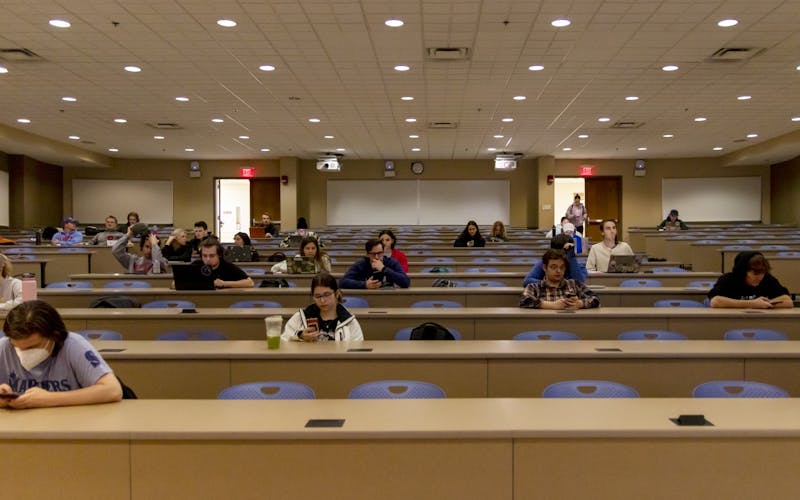Masking without a mandate – The Miami Student
Miami University’s COVID Response Team announced on March 9 that masks would no longer be required on campus when Butler County’s community risk level is low. During the past month, however, some students, staff and faculty have continued to mask up.
Madelyn Detloff, chair of the English department, wears her mask in close quarters, such as the classroom and department office, to protect those vulnerable to potential complications.
“Everyone has a different risk calculus depending on their circumstances, and it’s simple common sense to respect that with a sense of grace,” Detloff wrote in an email to The Miami Student.
Several other professors throughout the department also wear their masks, including Sara Webb-Sunderhaus, an associate professor of English and creative writing. She masks up in all public settings to protect herself and her family from potential health complications.
Although she’s unsure about other departments, Webb-Sunderhaus said most of the English department wears their masks.
“The English department definitely has a very strong culture of mask-wearing unless they’re alone in their office,” Webb-Sunderhaus said. “I don’t think I’ve seen any colleagues not wearing masks.”
Despite the many challenges, such as vocal strain, N-95 masks have become a necessary tool for Webb-Sunderhaus while teaching on campus twice a week.
“It would be convenient to not wear the mask and to not have to really focus on projecting my voice more and over-articulating to make sure that my speech isn’t muffled behind the mask,” Webb-Sunderhaus said. “That would be nice to not have to do that, but it’s not that big of a deal to me.”
Like Detloff and Webb-Sunderhaus, some students also continue wearing masks during in-class settings.
Morgan Thompson, a junior urban and regional planning major with a sustainability co-major, wears her mask during large lectures or when in close proximity to other students. Out of her five classes, Thompson said she wears her mask consistently in two to aid feelings of anxiety.
“It’s kind of like a security blanket,” Thompson said.
According to a study published in the Journal of Medical Internet Research, 71% of participating college students reported increased levels of stress throughout the pandemic.
Enjoy what you’re reading?
Signup for our newsletter
After the announcement that masks were no longer required, Thompson had mixed feelings, wishing the mandate was extended to the rest of the semester.
Due to the pandemic’s unpredictable nature, both Thompson and Webb-Sunderhaus aren’t sure if they’ll shed their masks going into the 2022-23 school year.
“I said to [my ENG 304 class], and I intended to say it kind of casually, [that] I honestly don’t know if I’ll ever teach without a mask again or when I will teach without a mask again,” Webb-Sunderhaus said. “And, I started tearing up. I got way more emotional about this than I thought because, normally, it’s not something that bothers me.”
While Webb-Sunderhaus said some individuals are doing everything in their power to keep others safe, the university itself could do more.
“I have, honestly, a lot of resentment and even anger at times with upper administration in that they have not done more to help faculty and students in these situations,” Webb-Sunderhaus said. “I think individual instructors are doing everything they can in terms of helping students in these situations … It’s a systemic issue.”
Some universities are already reinstating masking policies following an increase in the BA.2 variant, only a month after relaxing regulations, according to The New York Times.
In the future, Webb-Sunderhaus said it’s important to remember that some faculty members and students are still at high risk for COVID-19 and should be accommodated properly.
“The majority of faculty can teach in-person safely, but there are some who cannot,” Webb-Sunderhaus said. “And, I do not think the university has done a good enough job in protecting … those members of the faculty and those students, which is part of the reason why we need a union.”



